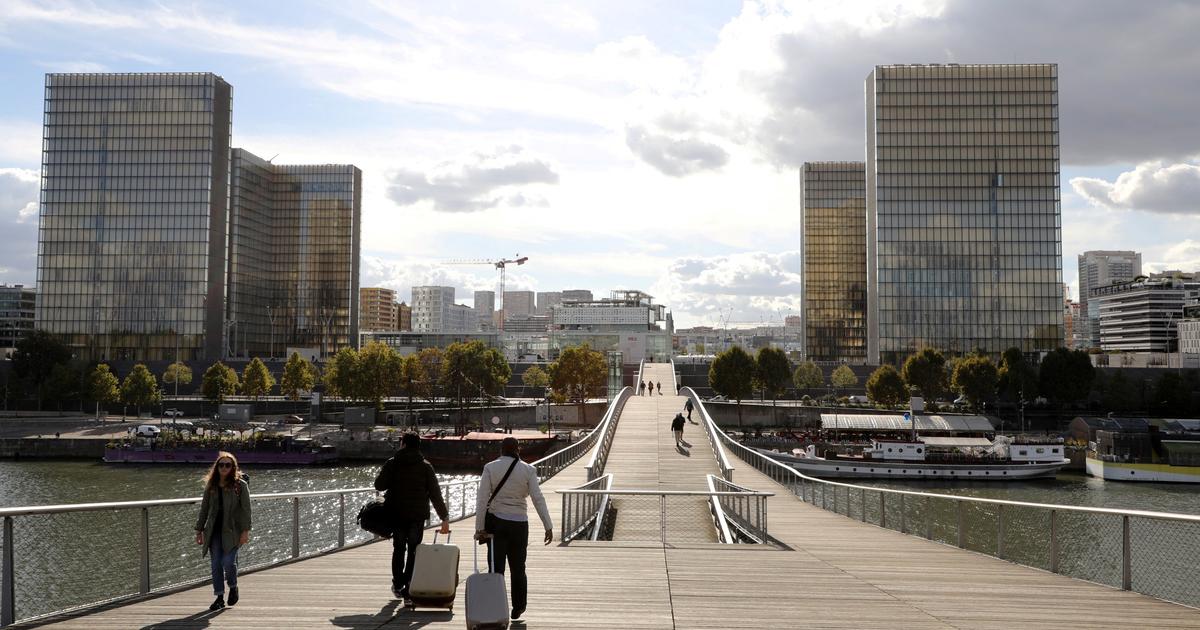Enlarge image
Emmanuel Macron and his wife leave the voting booth: mood test before the presidential election in spring
Photo: Ludovic Marin / dpa
It is true that the regional elections in France are only about comparatively little power. But ten months before the presidential election, they are considered a political test of sentiment - especially for the right-of-center spectrum. For the first time, Marine Le Pen and her Rassemblement National (RN) wanted to win a region. Before the first round, polls had seen the right-wing radical RN as the strongest force in several previously conservatively governed parts of the country.
Instead, the Republicans and other conservatives triumphed unexpectedly on Sunday, sometimes with a very large lead.
Seven of the twelve regions on the French mainland went to the conservative lists in the second round of regional elections - including the much-noticed capital region Île de France as well as the particularly hotly contested Provence-Alpes-Côte d'Azur region in the south-east of the country.
And suddenly it looks like they can stir up the expected duel between Emmanuel Macron and Le Pen in April 2022.
Politically, the conservatives can actually look back on a disastrous decade: in 2012 Nicolas Sarkozy lost the presidency.
In 2017, her presidential candidate, François Fillon, stumbled upon paying his wife hundreds of thousands of euros in taxpayers' money for invented jobs.
In 2020 they lost important cities such as Marseille and Bordeaux to the left and the green.
Now they are back.
However, the social democratic Parti Socialiste and its leftist lists also did better than expected, they were able to defend all five regions in which they have ruled so far.
In contrast to the conservatives, however, it is difficult to derive any national ambitions for them.
Candidates are missing, as is a clear plan to unite left and green alliances in order to even get close to the runoff election.
The majority of the French vote center-right to far-right.
If you add up the votes for Macronists, conservatives and right-wing extremists in the regional elections, you get around two thirds of the votes.
The losers in the election: Le Pen and Macron
One of the biggest losers in the election is probably Marine Le Pen, who is still in the tenth year of her party chairmanship and has to wait to win a relevant election in France (excluding EU elections).
The regional elections should bring her two things: First, the opportunity to show before the presidential elections that right-wing extremists can also rule.
And secondly, a symbolic victory over Emmanuel Macron, whose party "La République en Marche" (LREM) is not at all anchored in the country and had no prospect of success.
Now the RN couldn't even make the race really exciting where it had won the first lap: In Provence-Alpes-Côte d'Azur, the conservative candidate won with an advantage of almost 15 percentage points.
more on the subject
Jordan Bardella on his party leader Marine Le Pen: "France's populist moment has come" By Britta Sandberg from Mormant, Paris and Saint Malô
The second big loser is Emmanuel Macron.
For him, the regional elections could be summarized as follows: Although his party never had a chance of victory, it still managed to clearly disappoint the low ambitions.
The fact that several candidates failed in the first round at the 10 percent hurdle for the second ballot was just as embarrassing as the meager seven percent of the votes that LREM alliances achieved nationwide in the second round.
For comparison: Le Pen's Rassemblement National received around 20 percent of all votes.
In addition, President Macron is also blamed for the greatest political disaster of the elections: the historically low voter turnout.
As in the first ballot, only about a third of all eligible voters tried to vote on Sunday.
In 2015 it was 58 percent.
That makes French democracy the biggest loser, in which fewer and fewer people seem to want to actively participate.
Why did so few French people vote?
In the week between the polls, polling institutes and the media sounded out how tired the French were.
According to a survey by the Viavoice institute and the left-wing daily newspaper »Liberation«, for example, many non-voters find that politicians do not care about their concerns and do not understand their concerns, or that they are generally tired of political debates.
Young and poorer people in particular did not vote;
Among the 18 to 24 year olds, 87 percent stayed at home in the first ballot.
The trend is not entirely new: the local elections in 2020 and the parliamentary and presidential elections in 2017 already set negative records for voter turnout.
more on the subject
Holidays in Italy, France, Spain: this is how the summer holidays between the Mediterranean and the Atlantic are by Francesco Collini, Frank Hornig, Steffen Lüdke and Britta Sandberg
To what extent the new low point is related to the Covid-19 pandemic is unclear.
For a good week, for the first time since September, there has been no evening curfew, the restaurants and cafes have also reopened, and half of the French have been vaccinated at least once.
In contrast to the local elections a year ago, only a few people are unlikely to have voted for fear of infection.
We can only speculate whether the past 15 months with severe restrictions on fundamental rights and little public debate have politically exhausted the country.
Government spokesman Gabriel Attal downplayed responsibility for the debacle on election night: It is the task of all parties to interest people in politics.
What does the result of the regional elections mean for the presidential election?
In view of the low turnout, it would be wrong to read too much into the results. Even if many people abstained in the presidential election, at least twice as many people should vote as on the previous two Sundays. The field of candidates for the coming year is also still largely open. And while Macron never stood a chance in the regional elections, he will attract the most attention ex officio next spring. At 50 percent, his approval ratings are currently quite high by French standards, and with a lot of benevolence a hidden positive message can even be discovered in the result of the regional elections: the French have opted for stability, no one was voted out of office anywhere on the mainland.
Still, Macron and his adversary Le Pen seem weakened - while the Conservatives are much better off today than expected.
If they manage not to dismantle themselves in the search for the right candidate, he or she could make it to the runoff election next spring.
The only decisive question is: who will the conservatives then obstruct the way into the second round?
Emmanuel Macron or Marine Le Pen?









